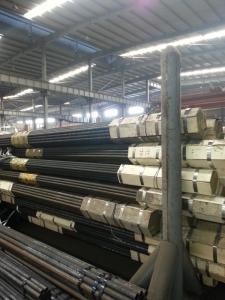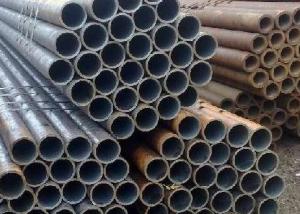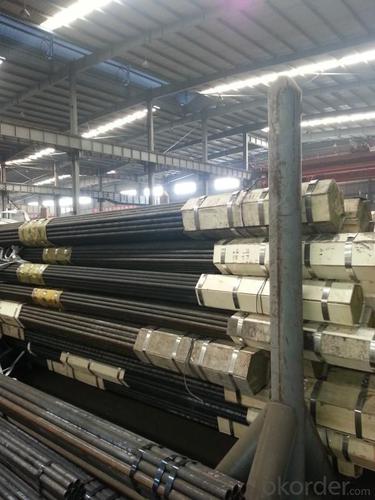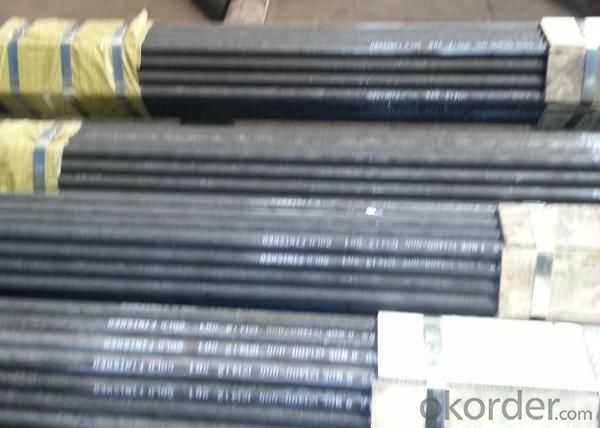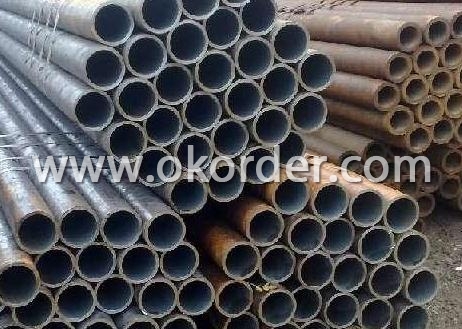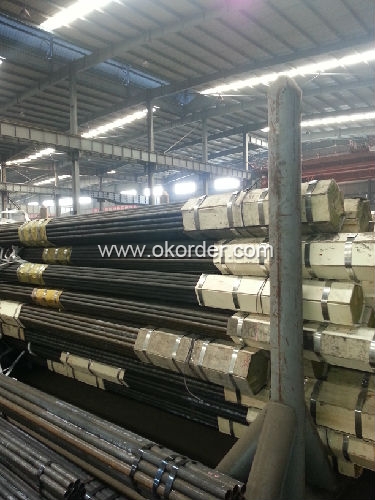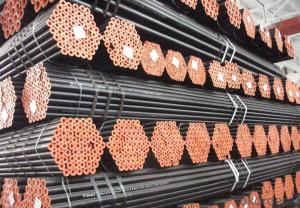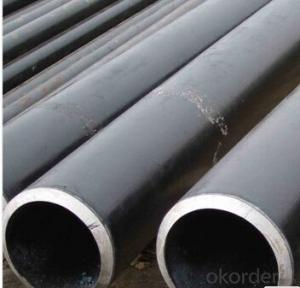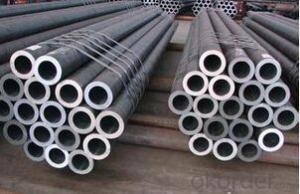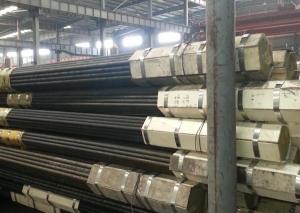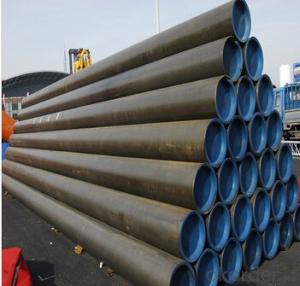Seamless Medium-carbon Steel Tubes For Boilers And Superheaters
- Loading Port:
- China Main Port
- Payment Terms:
- TT or LC
- Min Order Qty:
- 20MT m.t.
- Supply Capability:
- 5000 Tons Per Month m.t./month
OKorder Service Pledge
OKorder Financial Service
You Might Also Like
Usage/Applications: For manufacture wal panel ,economizer,reheater,superheater and steam pipeline of boilers. Packaging & Delivery: Each bundles pipes will be bundled with 6-8 pcs steel strips and with shipping marks and 2 nylon strips 40-50 days delivery on china port upon receiving orinigal LC or prepayment.
| ||||||||||||||||||||||||||||||||||||||
- Q: What are the common applications of steel pipes in the water distribution system?
- The common applications of steel pipes in the water distribution system include carrying potable water from the water treatment plants to homes and businesses, transporting water for irrigation purposes, and facilitating the flow of water in industrial processes. Steel pipes are often preferred due to their durability, resistance to corrosion, and ability to handle high water pressure.
- Q: What is the standard length of a steel pipe?
- The standard length of a steel pipe can vary depending on the application and industry, but commonly it ranges from 18 to 24 feet.
- Q: Can steel pipes be used for oil drilling operations?
- Yes, steel pipes are commonly used for oil drilling operations due to their strength, durability, and resistance to high pressure and extreme temperatures.
- Q: Can steel pipes be used for underground cable conduits?
- Yes, steel pipes can be used for underground cable conduits. Steel pipes have high strength and durability, making them suitable for protecting and housing cables underground. They provide excellent protection against external elements and can withstand a wide range of environmental conditions. Additionally, steel pipes offer good resistance to corrosion, ensuring the longevity of the cable conduit system.
- Q: Can steel pipes be galvanized?
- Yes, steel pipes can be galvanized.
- Q: How are steel pipes used in petrochemical plants?
- Steel pipes are extensively used in petrochemical plants for various applications such as transporting fluids, gases, and chemicals. These pipes are commonly used for the transfer of raw materials, intermediates, and finished products within the plant. They are also utilized for process lines, cooling systems, and as structural components in petrochemical plants. The durable and corrosion-resistant nature of steel makes it an ideal choice for withstanding the harsh conditions and high-pressure environments typically found in these facilities.
- Q: What are the factors to consider when selecting steel pipes for a specific application?
- When selecting steel pipes for a specific application, factors such as pipe diameter, wall thickness, material grade, corrosion resistance, temperature and pressure requirements, environmental conditions, and cost should be considered. Additionally, factors like durability, strength, weight, ease of installation, and compatibility with other components in the system should also be taken into account.
- Q: Are steel pipes suitable for hydronic heating systems?
- Yes, steel pipes are suitable for hydronic heating systems. Steel pipes are known for their durability, strength, and resistance to high temperatures and pressure, making them an excellent choice for circulating hot water in hydronic heating systems. They can effectively handle the demands of heating systems and provide reliable and long-lasting performance.
- Q: How are steel pipes repaired in case of damage or leaks?
- Various methods can be used to repair steel pipes in the event of damage or leaks. Welding is a common approach where a filler material is melted along with the damaged or leaking area, creating a strong bond that seals the leak. This method is effective for small to moderate-sized leaks and finds wide application in industries like oil and gas, plumbing, and construction. Another method involves the use of mechanical couplings. These couplings are designed to connect two sections of pipe securely, ensuring a tight connection. They can be utilized to repair damaged or leaking sections of a steel pipe by removing the damaged area and replacing it with a new section that is linked using the mechanical coupling. This method is particularly useful for larger leaks or damaged sections that cannot be repaired through welding. In certain cases, temporary fixes can be applied using pipe clamps or epoxy compounds. Pipe clamps are employed to seal the damaged area tightly, preventing further leakage. On the other hand, epoxy compounds are directly applied to the damaged or leaking section, creating a temporary seal that stops the leak until a more permanent repair can be carried out. It is essential to consider the severity and location of the damage or leak, as well as the specific requirements of the application, when deciding on the method of repair. In some instances, it may be necessary to replace the entire section of the steel pipe if the damage is extensive or if multiple leaks are present. It is advisable to consult a professional or a specialized pipe repair service to determine the most suitable repair method for a particular situation.
- Q: Is there any difference between HFW steel pipe and ERW steel pipe?
- High frequency welding uses the skin effect to concentrate the energy of the high frequency current on the surface of the workpiece, and uses the proximity effect to control the position and range of the high frequency current flow path. The speed of the current is very fast, it can in a short period of time will be adjacent to the edge of the steel plate heating, melting, and through the extrusion docking, each has its own advantages, but also each has its own shortcomings. Generally according to specific circumstances, specific analysis of specific choices.
1. Manufacturer Overview
| Location | Wuxi, China |
| Year Established | 1991 |
| Annual Output Value | 300,000Tons |
| Main Markets | Europe; Southeast Asia; etc. |
| Company Certifications | API 5L;API 5CT;API Q1;ISO/TS29001 |
2. Manufacturer Certificates
| a) Certification Name | |
| Range | |
| Reference | |
| Validity Period |
3. Manufacturer Capability
| a) Trade Capacity | |
| Nearest Port | Wuxi; Shanghai |
| Export Percentage | 41% - 50% |
| No.of Employees in Trade Department | 3900-4000 People |
| Language Spoken: | English; Chinese; Spanish |
| b) Factory Information | |
| Factory Size: | Above 450,000 square meters |
| No. of Production Lines | Above 10 |
| Contract Manufacturing | OEM Service Offered;Design Service Offered |
| Product Price Range | Average |
Send your message to us
Seamless Medium-carbon Steel Tubes For Boilers And Superheaters
- Loading Port:
- China Main Port
- Payment Terms:
- TT or LC
- Min Order Qty:
- 20MT m.t.
- Supply Capability:
- 5000 Tons Per Month m.t./month
OKorder Service Pledge
OKorder Financial Service
Similar products
Hot products
Hot Searches
Related keywords
